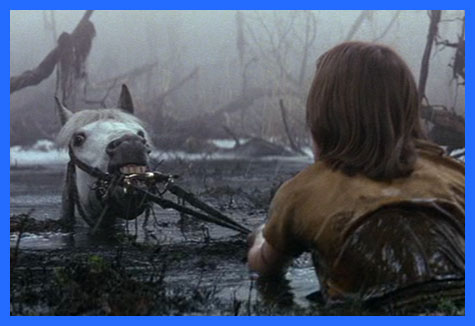
Wolfgang Peterson's 1984 adaption of Michael Ende's book THE NEVERENDING STORY presents a rich colorful world called Fantasia, which is strewn with many dangers. First and foremost is "The Nothing" which threatens to devour and erase everything in existence if a young hero named Atreyu (Noah Hathaway) can't find a way to thwart it. If that obstacle wasn't enough, the dark force elicits the aid of a horrific sharp-fanged giant wolf monster with glowing eyes called Gmork who steadfastly shadows Atreyu in hopes to rip him to shreds. Strangely enough though, THE NEVERENDING STORY's most traumatizing scene involves neither of these embodiments of evil but rather a mundane, in appearance, swamp.

Early on in his quest, Atreyu and his trusty sidekick, a majestic white horse named Artex, are required to gain information from a giant turtle named Morla. To find Morla they must first travel through what is known as the Swamps of Sadness. Unfortunately, as one passes through said swamp they are taken over by depressive thoughts and hopelessness. Though Atreyu is at least partially protected by an amulet, Artex the horse succumbs to despair and begins to sink slowly into the mud. Atreyu almost laughs it off at first but then begins to realize his best friend may be beyond rallying. Atreyu desperately pleads with Artex to fight against the sadness that has overtaken him. He begs, "You have to try. You have to care. You are my friend. You have to move or you're going to die! Don't quit, Artex!" but to no avail. Suddenly the beautiful white creature has completely disappeared into the mud seemingly never to return and Atreyu is left devastated, lost and alone.

It seems impossible that a children's film could be so emotionally cruel especially at such an early stage of the story. As heartbreaking as the scene would obviously be to children, it also loudly resonates with anyone of any age who has ever lost anyone. It would be one thing to witness Artex gallantly die in battle or be physically defeated but something about his psychological turmoil and loss of will to exist is especially difficult to grapple with. Most stories directed at children inform us that we have the power to will ourselves to victory (think of Tinker Bell's resurrection in Peter Pan) but here even the most sincere and desperate pleas and prayers are coldly denied. It's like a harpoon of reality striking a fluffy cartoon bunny. We don't really even know Artex at this point in the story and yet of course we do; anyone who has ever loved anyone recognizes how Atreyu feels towards his friend. Death itself is eternally painful to deal with and when it's entangled with the demise of hope, it's somehow even harsher.

I've never been so happy to deliver a SPOILER ALERT in my life. After jumping through a zillion hoops we won't get into here, Atreyu's mission to save Fantasia is a success. Turns out there's a reason the film and book are titled as they are and The Nothingness ain't nothing compared to the power of imagination. Phew. During a victory lap we get to see the most comforting image to ever grace a screen, that of Atreyu and Artex riding together in full optimistic victorious glory (I have to say, there's only two types of people in this world, those who ball their eyes out during this movie and heartless monsters who should be avoided at all costs). I'm almost mad at THE NEVERENDING STORY for yanking on my heartstrings in such a brutal matter but how can I not be impressed that its depiction of loss is more devastatingly relatable than a thousand adult dramas that tackle the same subject put together. Watching it again as an adult, I can tell you it has lost zero of its impact, in fact, due to life experience, I can sadly relate to it even more. Damn those swamps of sadness.


I saw The NeverEnding Story for the first time since I was a kid just a few months ago and yeah, that scene was most upsetting. Although, in a sense the film is more faithful to genuine fairytales than are such things as Disney films and the like because it deals with death and sadness and "darker" subject matter. Fairytales really aren't kids stuff.
All that being said, I don't like animals being hurt or killed in real life or film or any which way because they are genuinely innocent.
People? fuck'em, let'em get killed and with each passing day, that sentiment deepens. I've got no abstract love of "humanity".
For me, relationships with animals have always been more rewarding than with humans, so it bothers me to see their deaths in films (even if fake).
One of the first experiences of such cinematic upset I can remember was Halloween. I liked Michael Myers up until he killed Lester; that really rubbed me the wrong way.
I love, love, love this movie. It was a major part of my childhood. I was a book-reading kid who was often bullied, so the story resonated with me for obvious reasons. I went as far as to buy the (region-free) Norwegian blu ray, as it has a better transfer than the American blu (fortunately, it was fairly cheap).
A couple of years ago, I read Michael Ende's novel, which is terrific, but subtly different in certain ways. The movie only adapts the first half of the book (the first sequel somewhat adapts the second half, but with substantial differences). In the movie, it's subtly suggested that both Bastian and his father are still mourning the loss of Bastian's mother, but Ende places much more emphasis on the loss in his book. The book is very philosophical, even existential in places, with depression being a major theme (The Nothing, of course, being a metaphor). I can understand why Ende disliked the movie, though I love it. Petersen shaped the story to fit the style of the Spielberg child's fantasy film, and the novel isn't that kind.
The novel is also much more meta-textual, which I won't describe in detail to spare anyone who hasn't read it yet. Suffice to say, that level of the story can't be adapted from written fiction to the moving image very easily, though Wolfgang Petersen tries occasionally.
I think both Artax's death and the more abstract threat of The Nothing both scared me as a kid. One is a personal loss, the other a more abstract threat, though no less terrifying. The Nothing is an absence of anything, or everything, which can be horrible to contemplate. Oddly, the Land of Nothing in The Beatles' Yellow Submarine movie scared me for the same reason. I guess you can draw a parallel between the joy of The Beatles' music and the triumph of Bastion's imagination as the treasures that save the day.
Er, it’s the Sea of Nothing, re: Yellow Submarine.
Ghastly1
Totally get that. I’m way more sensitive to animal deaths than human ones. I even hate killing animals in video games. And yep Myers was way out of line with Lester!
SDC
I gotta read that book. All I could think of watching Artax die this time around was of my cat who passed away after a long illness and it really killed me! It’s really a beautiful movie though all and all and really needs to be seen widescreen. I seem to remember The Beatles saving Zarkov in Flash Gordon (’80) too when they tried to brainwash him!
I just watched this movie in full for the first time within the last year or so, and really enjoyed it! So many practical effects that are rough around the edges but totally charming, and they all absolutely lend themselves to the imaginative nature of the story. (Thankfully, the rights seem to be indefinitely tied up, so perhaps we'll be spared any slickly-produced, CGI-heavy remake for the foreseeable future).
I remember seeing the swamp scene and just the swamp scene on TV as a kid in the 90s and it was enough to put me off of seeing the complete film for decades. Though I enjoy it now as an adult, I can safely say it would've totally stressed me out as a kid, even with the resurrection of Artex at the end, so I probably made the right call.
On another note, after watching it, I was a little concerned about the real horse's safety during that scene. But after reading about it online (I think it was EW who did an oral history with the filmmakers a few years ago), it's very clear the horse was well taken care of, and that scene was rehearsed extensively to ensure the safety and comfort of the horse, who by the time of filming, was very relaxed. That made me very happy to read!